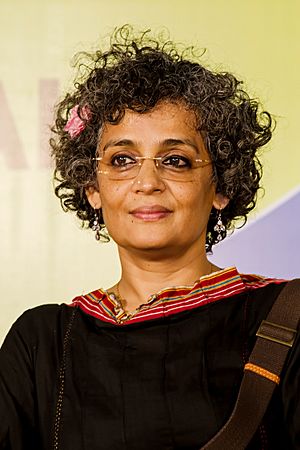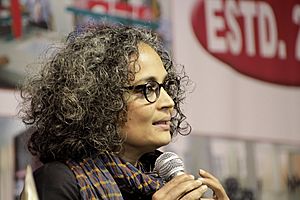Arundhati Roy facts for kids
Quick facts for kids
Arundhati Roy
|
|
|---|---|

Roy in 2013
|
|
| Born | Suzanna Arundhati Roy 24 November 1961 Shillong, Assam, India |
| Occupation | Writer, essayist, activist |
| Education | Lawrence School |
| Alma mater | SPA Delhi |
| Period | 1997–present |
| Genre | Fiction, non-fiction |
| Notable works | The God of Small Things |
| Notable awards |
|
| Spouse |
|
| Parents | Mary Roy (mother) |
| Relatives | Prannoy Roy (cousin) |
| Signature | |
 |
|
Suzanna Arundhati Roy (born 24 November 1961) is an Indian author famous for her novel The God of Small Things. This book won the Booker Prize for Fiction in 1997 and became a bestseller.
Besides writing novels, Roy is also a well-known activist. She speaks out on issues related to human rights and protecting the environment. In 2024, she won the PEN Pinter Prize for her courage as a writer.
Contents
Early Life and Education
Arundhati Roy was born in Shillong, India. Her mother, Mary Roy, was a women's rights activist, and her father, Rajib Roy, was a tea plantation manager. Her parents separated when she was two, and she moved with her mother and brother to Kerala.
Roy attended Corpus Christi School in Kottayam and later the Lawrence School in Lovedale, Tamil Nadu. She can speak English, Hindi, and Malayalam.
After finishing school, she moved to New Delhi to study architecture at the School of Planning and Architecture. There, she met an architect named Gerard da Cunha, and they were married from 1978 to 1982.
Writing Career
Early Work in Film
Before becoming a famous novelist, Roy worked in movies and television. She wrote the screenplays for the films In Which Annie Gives It Those Ones (1989) and Electric Moon (1992).
For In Which Annie Gives It Those Ones, which was based on her own experiences as an architecture student, she won the National Film Award for Best Screenplay.
The God of Small Things
Roy started writing her first novel, The God of Small Things, in 1992 and finished it four years later. The story is partly based on her own childhood in Aymanam, a town in Kerala.
The book was a huge success all over the world. It won the 1997 Booker Prize, a very important award for books written in English. It was also named one of the best books of the year by The New York Times. The book sold millions of copies and was translated into many languages.
Later Writing
After her first novel, Roy focused more on writing non-fiction essays about politics and social issues. In 2017, she published her second novel, The Ministry of Utmost Happiness. This book was also very successful and was nominated for major awards like the Man Booker Prize.
Her essays have been collected into several books, including My Seditious Heart.
Activism and Social Causes
Arundhati Roy is known for using her voice to support causes she believes in. She often writes and speaks about human rights and environmental protection. She is a well-known figure in the anti-globalization movement, which questions the power of large international companies.
Support for Kashmir
Roy has expressed her support for the independence of Kashmir. She believes the people of Kashmir should have the right to decide their own future. Her views on this topic are controversial in India and have been criticized by some political parties.
Narmada Dam Project
Roy campaigned against the Sardar Sarovar Dam, a large dam project on the Narmada River in India. She argued that the dam would force hundreds of thousands of people to leave their homes without proper support.
She donated the money she won from the Booker Prize to the group protesting the dam, called the Narmada Bachao Andolan.
Views on U.S. Foreign Policy
Roy has been a strong critic of United States foreign policy. After the September 11 attacks, she wrote an essay called "The Algebra of Infinite Justice." In it, she questioned the U.S. military invasion of Afghanistan. She has also spoken out against the Iraq War.
Other Causes
Roy has written and spoken about many other important issues, including:
- India's Nuclear Program: She wrote an essay called The End of Imagination to criticize the Indian government's decision to test nuclear weapons.
- The 2008 Mumbai Attacks: She argued that to understand such events, one must look at the region's history and social problems.
- The Naxalite Movement: She has written about the conflict between the Indian government and Naxalite rebels, arguing that it is a "war on the poorest people in the country."
Personal Life
In 1984, Roy married filmmaker Pradip Krishen. They worked together on several film projects. Although they are still married, they live separately.
Roy is a cousin of Prannoy Roy, a well-known media figure in India. She currently lives in Delhi.
Awards and Recognition

Arundhati Roy has received many awards for her writing and activism. Some of her most important awards include:
- 1989: National Film Award for Best Screenplay for In Which Annie Gives It Those Ones.
- 1997: Booker Prize for The God of Small Things.
- 2002: Lannan Foundation's Cultural Freedom Award.
- 2004: Sydney Peace Prize for her support of non-violence.
- 2011: Norman Mailer Prize for Distinguished Writing.
- 2014: Named one of the 100 most influential people in the world by Time magazine.
- 2023: Lifetime achievement award at the 45th European Essay Prize.
- 2024: PEN Pinter Prize from English PEN, a human rights organization.
See also
 In Spanish: Arundhati Roy para niños
In Spanish: Arundhati Roy para niños
- List of Sahitya Akademi Award winners for English
- List of Indian writers
- List of peace activists
- Indian English literature
- Naxalite–Maoist insurgency
- Iraq War
 | Bessie Coleman |
 | Spann Watson |
 | Jill E. Brown |
 | Sherman W. White |

